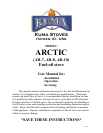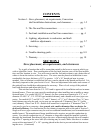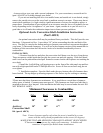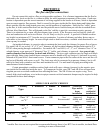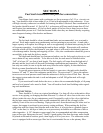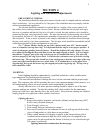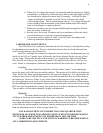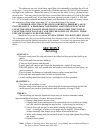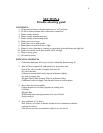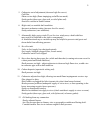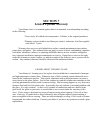
The carburetor on your Arctic has a main float valve internally to regulate the oil level
in the stove. It also has a separate, second safety float that can trip off if the oil level becomes
too high in the carburetor. Should this occur, you can reset the safety lever by clicking it back
down to start. You may need to reset the lever several times before the level of oil in the carbu-
retor returns to a normal level. Your Arctic has been rigorously tested to both U.L. 896 and
U.L. 307A for both residential and mobile homes, and should the fire snuff out for any reason,
the carburetor will not allow more than 3/4” of oil in the bottom of the burner.
IT IS IMPERATIVE THAT THE STOVE IS BURNING PROPERLY AS EX-
PLAINED ABOVE. A POOR DRAFT OR POORLY ADJUSTED STOVE COULD
CAUSE THE STOVE TO SOOT AND BUILD UP GASES INSIDE THAT COULD
CAUSE THE STOVE TO GO OUT AND THEN RE-IGNITE ON ITS OWN. THESE
FUEL RICH GASES CAN BE EXPLOSIVE.
Should the fire go out for any reason, NEVER ATTEMPT TO LIGHT A HOT STOVE!
Try to determine why the stove went out and then allow the stove time to cool for 30 minutes before
re-starting following the lighting instructions in this manual. If you have any questions about the
operation of your Arctic please check the trouble-shooting section of this manual or call your
dealer.
SECTION 5
Servicing
ANNUALLY:
*Remove catalyst and fire ring and inspect and clean out burn pot of any build-up or
debris.
*Check flue and clean out soot build-up.
*Clean out stove interior and drip pan.
*Lightly brush off catalyst and inspect for deterioration– replace if necessary.
*Check all gaskets: rope seal around door and window seal (check for loose glass– no
need to remove).
*Check oil tank for damage or leaks and clean or replace main tank filter.
*Check all lines and connections for leaks or deterioration.
*A draft reading should be taken for low– and high-fire before operation.
QUARTERLY:
*Turn stove off and allow to cool.
*Remove catalyst and clean out any carbon deposits from burner bottom and oil inlet
inside burner (may need to clean deposits more frequently if using #2 fuel).
WEEKLY:
*The de-coking rod must be operated at least once per week to eliminate carbon
deposits that build up where oil enters the burner bottom:
1. Remove front burner access cover.
2. Slightly back brass packing nut off (counterclockwise) to release de-coking
rod. (Be careful as packing nut may be hot. A glove may be necessary.)
3. Slowly draw rod out until it stops while rotating 360 degrees several
times. A small pair of pliers or vise grips may be helpful. This rod has a
scraper internally that scrapes away carbon from inside the line.
4. While still rotating, push the rod back in until it stops and tighten the packing
nut snugly.
5. Replace access panel.
*Note: If flame is burning lower than expected, you probably have carbon build-up in
the line or burner bottom near fuel inlet.
7



